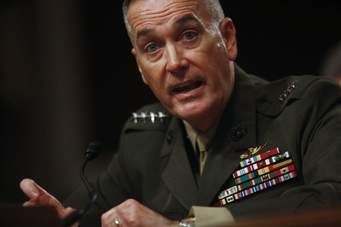 The Marine Corps commandant thought to be taking over the Joint Chiefs of Staff told lawmakers Russia was the “greatest threat" to US national security, echoing claims made by Air Force's civilian chief and the recently published US military strategy.
The Marine Corps commandant thought to be taking over the Joint Chiefs of Staff told lawmakers Russia was the “greatest threat" to US national security, echoing claims made by Air Force's civilian chief and the recently published US military strategy.
In a pre-confirmation hearing before the Senate Armed Services Committee, General Joseph Dunford called Russian actions “nothing short of alarming," backed weapons deliveries to the Ukrainian government and warned that budget sequestration will hurt the US military's capabilities.
“Russia presents the greatest threat to our national security," Dunford said. “If you want to talk about a nation that could pose an existential threat to the United States, I'd have to point to Russia."
White House Press Secretary Josh Earnest sought to distance President Barack Obama from Dunford's comments, saying they reflected the general's own assessment but not necessarily the “consensus analysis of the president's national security team."
Chairman of the Joint Chiefs of Staff is the highest-ranking military post in the US, acting as the chief military adviser to the president, the National Security Council and the Secretary of Defense. Obama nominated Dunford for the job in May, after the current CJCS Gen. Martin Dempsey announced his retirement.
Nicknamed “Fighting Joe" during nearly two years with the 5th Marine Division in Iraq, Dunford has commanded the US Marine Corps since October 2014.
The Marine commandant's statement comes just a day after US Air Force Secretary Deborah James told Reuters that she considered Russia “the biggest threat" to the US. James also said that NATO members should honor the promise they made to spend 2 percent of their GDP on defense, in order to combat the alleged threat from Moscow.
Dunford's written testimony contained 15 mentions of the word “aggression" in reference to Russia, and almost as many mentions of the effects of sequestration on military budgets.
Committee chairman John McCain (R-Arizona) and the ranking minority member Jack Reed (D-Rhode Island) also blasted the limitations on government spending imposed by the Budget Control Act. McCain described the limits as “self-inflicted wounds" that put American lives in danger, while Reed argued the budget instability undermined the morale of the troops and their families, as well as the confidence of military contractors.
The updated US National Military Strategy,published last week, calls for continued US military presence around the globe to counter both the “violent extremist organizations" such as Islamic State and what the Pentagon called “revisionist" powers such as Russia, China, Iran and North Korea, supposedly threatening US-enforced international law and order.
Meanwhile, the Pentagon has been shuffling money around to bolster armaments of armored vehicles stationed in Europe, develop new sonar sensors for the Navy, and refurbish nuclear missile silos and command centers.
The Army wants $160 million for an “increased lethality" program to equip Stryker armored vehicles with 30-milimeter cannons, Defense One reported. The Navy is requesting $5 million for new sonar sensors and another $24 million for towed sonars, suggesting concerns about the Russian submarine fleet. Among the other requests noted by the publication close to the Pentagon are $10 million to modernize the phones inside nuclear silos and $42 million for upgrades to Cheyenne Mountain, the nuclear command center in Colorado.
Washington is also looking to expand the training program provided to Ukrainian government forces, with high-ranking officers suggesting it would help US troops learn about Russian tactics. Visiting the Yavoriv training facility in western Ukraine on Wednesday, General Ray Odierno said that US troops could learn a lot from the Ukrainians about how the “Russians and separatists" were fighting.
“We haven't faced something like this ourselves for a while," Odierno told the Wall Street Journal.
While the Pentagon brass sound confident about the US military's ability to handle any existing enemy, Dunford admitted some doubts about the future.
“What keeps me up at night is our ability to respond to the unexpected," General Dunford told the Senators. "On balance, our force can deal with the challenges that we have now. But there is very little residual capability."
Source: rt.com On photo: Marine Corps General Joseph Dunford
 В Атырау -10
В Атырау -10